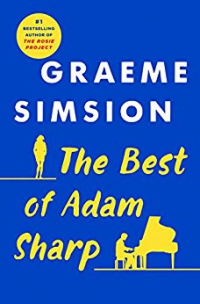Exit by Belinda Bauer
 Wednesday, February 24, 2021 at 5:59AM
Wednesday, February 24, 2021 at 5:59AM 
First published in Great Britain in 2020; published by Atlantic Monthly Press on February 2, 2021
Exit is a clever murder mystery concerning a death that may or may not be a murder. The story becomes progressively darker and more amusing as other lives are placed at risk from murders that may or may not be consummated.
The story revolves around the Exiteers, a group of people, mostly older, who help the sick and dying end their lives. They don’t want to cross the line by committing murder, so they are careful to take no fatal action of their own. Instead, they advise the soon-to-be-departed of a dentist who will sell them nitrous oxide. At the appointed hour, a team of two Exiteers arrives to provide comfort as their client stops breathing air and starts breathing nitrous. The Exiteers take a copy of the person’s Will (to prove, if they ever must, that they did not benefit from the death) and remove the nitrous cannister, making it appear that the client died a natural death.
The Exiteers are managed by Geoffrey Skeet from his wheelchair. Skeet sends Felix Pink and Amanda Bell to help Charles “Skipper” Cann make his way to whatever lies beyond. The enter the house and find a wheezing man in bed. The man grasps for a mask that is connected to the nitrous but drops it. Amanda makes the foolish mistake of handing it to him, perhaps becoming culpable for his death. That turns out to be the least of their worries when they discover that the person who died from inhaling the gas was not Charles at all, but his son Albert, who apparently thought he was reaching for his oxygen mask. Charles' grandson Reggie eventually reveals that he had arranged for the Exiteers to help Charles die, leading Felix (and the reader) to wonder whether the Exiteers were set up to kill the wrong man and, if so, whether Reggie was behind it.
Horse racing and loan sharks play a role in a plot that has nearly every character worried about paying debts, including Detective Constable Calvin Bridge. Calvin plays the horses and worries that a gangster, who placed a large wager on a horse that Calvin bet on, will seek retribution if the horse loses. Calvin has other worries as well, including his fear that his bosses will discover that his family members are all criminals. His biggest fear at the moment is that he won’t solve the mystery of Albert’s death.
Exit is a comedy of errors in which unexpected plot twists assure that nothing is quite as it seems. Belinda Bauer employs the understated humor that the British have long mastered to assure the reader’s constant amusement. The police get everything wrong and the reader will likely follow in their footsteps. The story does involve culprits and a murderous scheme, but the true culprits are skillfully concealed by Bauer’s deft misdirection. As one of the police inspectors says at the end, “I did not see that coming."
A couple of unexpected romances sweeten a plot that is never in danger of souring. Its focus on Charles, a crusty codger who wants to die, is tempered by the kindness of Felix, who is 75 but still sees the value in all lives, including that of Charles. Yet the novel also suggests, with good humor and a dash of wisdom, that choosing your own time and place and way to die might be all that anyone can ask.
RECOMMENDED
 TChris |
TChris |  Post a Comment |
Post a Comment |  Belinda Bauer,
Belinda Bauer,  UK in
UK in  Thriller
Thriller 